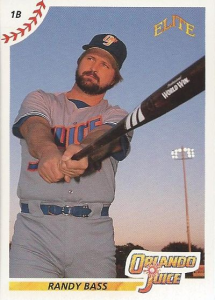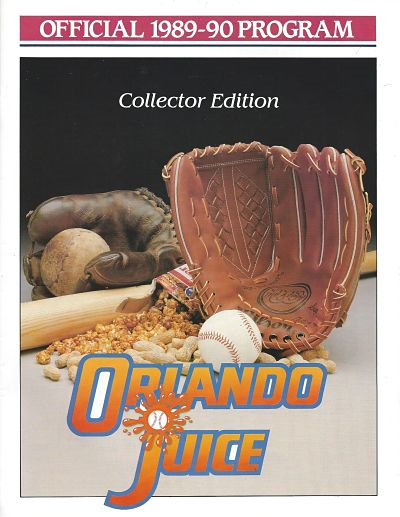Senior Professional Baseball Association (1989-1990)
Tombstone
Born: 1989 – SPBA founding franchise
Folded: August 1990
First Game: November 1, 1989 (W 3-1 vs. Bradenton Explorers)
Last Game: January 31, 1990 (W 5-4 vs. Winter Haven Super Sox)
Senior League Championships: None
Stadium
Tinker Field (5,700)
Opened: 1923
Demolished: 2015
Ownership & Affiliation
Owner: Phillip Breen
Major League Affiliation: Independent
Background
32-year old Jim Morley dreamt up the concept for the Senior Professional Baseball Association in January 1989. Morley played one season of minor league baseball in the San Francisco Giants farm system before moving to Colorado Springs and finding success as a commercial real estate broker. On vacation with his girlfriend at the Great Barrier Reef, Morley felt distracted by the cash flow challenges of his newly opened independent realty office. Morley later told the author David Whitford that he considered several new ventures as a means of generating some quick cash, including a bead store and a balloon delivery service. Ultimately, inspired by Senior PGA Tour, he settled on a baseball league for players ages 35 and older.
Morley paid $12.95 for a mail order book by a man named Jack Smalling, who compiled the last known addresses of several thousand retired Major League Baseball players for the benefit of autograph collectors. He sent letters describing his idea to 2,200 ex-ballplayers who debuted in the Majors between 1969 and 1978. Projecting salaries of $5,000 to $15,000 per month, it’s not surprising that he received hundreds of eager replies. More remarkable is that Morley quickly assembled a small group of willing investors. The founders of the Senior League included future Boston Red Sox and Liverpool FC owner John Henry.
Incredibly, barely 11 months after conceiving his idea, Morley stood on the field at Al Lang Stadium in St. Petersburg, Florida presiding over opening night of his eight-team, Florida-based league. The league attracted some big names, including Ferguson Jenkins, Bill Madlock, Bill Lee, Mickey Rivers, Rollie Fingers and Dave Kingman. The 35-and-over rule was relaxed for catchers, who could be as young as 32. Pitcher Ed Rakow, who made his Major League debut 29 years earlier in 1960 was league’s oldest player at age 54.
On The Field
 The Juice roster featured many familiar names from the 1970’s and 1980’s including Jose Cruz, Tom Paciorek, Pete Falcone, U.L. Washington and Bake McBride.
The Juice roster featured many familiar names from the 1970’s and 1980’s including Jose Cruz, Tom Paciorek, Pete Falcone, U.L. Washington and Bake McBride.
One of the most intriguing Juice players was Randy Bass, a legendary minor league slugger of the 1970’s who failed to stick in the Majors. Bass went to Japan and became one of the great gaijin (American) superstars of the league. He won back-to-back Japanese triple crowns in 1985 and 1986.
The Juice were so-so on the field, posting a 37-35 record, and horrid at the box office, averaging a league-worst 400 fans per game.
Phillip Breen
The Orlando Juice franchise had one of the league’s most active owners in Phillip Breen, although the true extent of Breen’s activities would only become apparent months later.
Breen, meanwhile, took a hands-on role in the growing pains of the young league. Breen served as President of Group One Mortgage in Southfield, Michigan and had more ready access to cash than some of the other fledgling owners. When the Ft. Myers Sun Sox ran into early cash flow problems, Breen stepped in with the offer of a $550,000 start-up loan, although the league vetoed the proposal. Later, when St. Lucie Legends owners Joe Sprung and Burt Adams ran out of funds, Breen recruited a friend, Lenny Woolf, as an angel investor. Woolf put in $400,000 to allow the Legends to finish the season.
But in December 1989, Breen’s facade began to collapse. A routine audit at Breen’s employer, Group One Mortgage, revealed that payments from two other mortage companies, First Oakland Mortgage Company and Franklin Mortgage Company, had fallen behind. Breen had purchased mortgages from both companies and then re-sold them to the governmental mortgage company, Freddie Mac. Group One Mortage was making its payments on time, but with the originators in arrears on payments to Group One, the company was out $240,000 so far on the transactions. Breen had personally approved the deals and promised an explanation and a quick fix to Group One owner Douglas Hardy. But when Breen stopped returning calls, Hardy called the FBI.
Vanished
On January 7th, 1990, Winter Haven Super Sox owner Mitch Maxwell reached Breen by phone to discuss a Senior League TV rights deal. Their brief conversation was one of the final known contacts anyone would have with Breen. The following day Breen skipped a schedule meeting with Hardy and the FBI. Then he vanished off the face of the Earth.
The ensuing investigation revealed that Breen’s scam to be much larger than the $240,000 originally detected. First Oakland Mortgage and Franklin Mortgage were fictitious entities conjured by Breen himself. The mortgages that Breen purchased from them were imaginary. But the funds paid out by Group One were not. They went to Breen to fund his baseball investments, boats, vacation homes and a brokerage account with $1 million stashed in it. Even the $400,000 that Woolf put into the Legends turned out to be Breen’s dirty money which Woolf seems to have interpreted as either a gift or a loan.
The thefts went undetected, so long as Breen never fell behind on the interest payments due back to Group One. And if he did, he could also sell Group One another imaginary mortgage to raise the needed funds. Why he failed to do so in December 1989 remains a mystery that Breen has never had to explain. Breen has never been located. The total scale of his theft has been estimated at $10 million.
The End
After Breen’s disappearance, the Senior League had to cash in a letter of credit to fund the final Juice payroll of the 1989-90 SPBA season. Unsurprisingly, the Juice folded after the season ended, along with three other clubs. The SPBA returned in the fall of 1990 with two expansion teams in Arizona and California. The circuit remained desperately under capitalized and folded in December 1990, midway through its second season.
Breen was featured in the November 20th, 1991 episode of Unsolved Mysteries.
Orlando Juice Shop
[auction-nudge tool=”listings”]
In Memoriam
Former Detroit Tiger Gates Brown, who managed the Juice for the first month of the 1989-90 season before getting fired, died of a heart attack at age 74 on September 27, 2013. New York Times obituary.
Downloads
Senior Professional Baseball Association standard player contract
Senior Professional Baseball Association Standard Player Contract
Links
###


One Response
“Gaijin” means, simply, “foreigner.”
In practice, it usually refers to an American in Japanese baseball. Etymologically, it’s any non-Japanese.